Last Updated on 2022-10-21 by Joop Beris
Recently, a student from the USA contacted me to ask if I was willing to participate in an email interview. His professor gave him the assignment to interview a non-believer or a sceptic. Since he had earlier read my article “9 logical reasons why there is no God“, he wanted to interview me. I asked him if it was okay if I wrote an article about this interview on my blog and he agreed to that, on the condition that I would not reveal more about him than his first name. Of course I accepted that condition. I will be referring to him as Bryan but I will not reveal his college or any other details that might expose him. What I will expose, is why religion doesn’t belong in the science classroom.
Free inquiry
This article isn’t about making fun of Bryan. Since this blog is my podium and not his, I will do my best to represent his point of view fairly and with an open mind. One of the reasons for having my blog in the first place, is to educate, to engage and to challenge. Equally, it’s for other people to challenge me. Bryan sent me a refutation of my article “9 logical reasons why there is no God“. I appreciate that because free inquiry and an open exchange of ideas are very important to me. His response helps me to improve my article and that alone is reason enough to be grateful for the time he took to write a refutation.
As I wrote to Bryan, I appreciate a free exchange of ideas because I think that’s the best way to learn. We don’t have to agree on everything but respectful discussion of ideas is always welcome. Unfortunately, too many of such discussions these days are about “winning the argument” or “beating the opponent” and deteriorate into name-calling, etc. That’s not helpful and actually means that both parties become more convinced of their side and less willing to debate openly. If I have a side myself, it’s the side of free inquiry where no one is afraid to ask even tough questions.
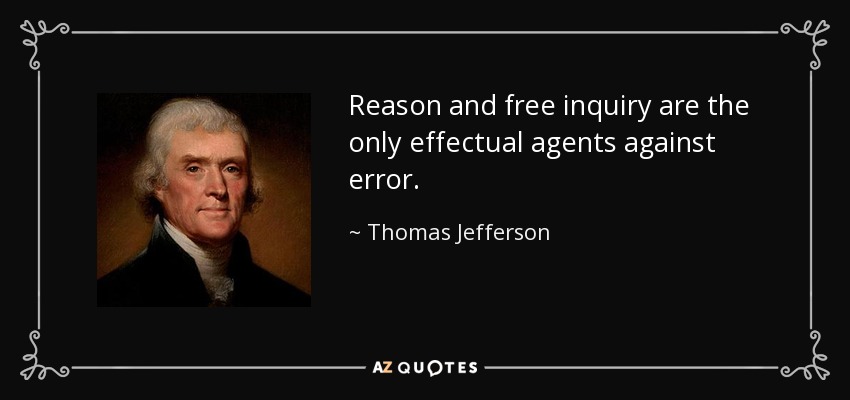
A refutation to “9 logical reasons why there is no God“
Let’s take a look at Bryan’s refutation before I explain why religion doesn’t belong in the science classroom. He asks that I read his article with as much of an open mind as he read mine, which is fair. He also asks if I would point out any flaws in his logic which I will be happy to do. In his next sentence he tells me that he believes the bible is absolutely true. Immediately, I am forced to point out that this is not having an open mind. If we begin from the premise that whatever the bible says is absolutely true, that means our mind is closed. We are not open to arguments that might contradict those from the bible.
Open-mindedness
What does it mean to be open minded? It means being open to new ideas. It means setting aside your own preconceived notions and doxastic commitments so that we can consider opposing ideas. Having an open mind is a willingness to consider evidence, not the willingness to accept claims without any. If I am to be open-minded, I must reject the idea that the bible is absolutely true. Bryan should do the same, at least temporarily. To be clear, I am willing to consider individual claims made in the bible but I am not willing to a priori accept all claims made in the bible.

There are further problems with using the bible as evidence for religious claims. As I have pointed out, holy books aren’t proof of religious claims, they themselves are the claim. If you see your holy book as proof that your religion is true, you are using circular reasoning, which is a logical fallacy. In addition, if we grant that the bible is absolutely true, we must grant it for all holy books. A Muslim could just as easily say that the Quran is absolutely true. On what grounds would Bryan refute such a claim?
Attributes of god
Bryan then proceeds to add several attributes to the four attributes I listed in my article. The four I chose are:
- omniscience
- omnipotence
- omnipresence
- omnibenevolence
I used these because because we lack a proper definition of what god is. The three monotheisms all agree on these 4 so I used them as a baseline. Bryan adds the following based on the bible:
- Just
- Merciful
- Eternal
- Infinite
I have no problems with adding these if talking about the Christian god specifically but I wasn’t. In “9 logical reasons why there is no god” I addressed the general concept of god shared by the three monotheisms. Besides that, adding these four seems somewhat redundant. An omnipresent god would need to be eternal and infinite, otherwise it would not be omnipresent. We’d also expect an omnibenevolent god to be merciful. However the idea of justice entails that people get what they deserve, which contradicts the idea of mercy. Mercy means forgiving an offender despite his/her wrongdoing.
1. Contradictions between the major religions
In my article, I made the point that since the major religions contradict each other, they can’t all be true. Bryan responds to that as follows:
Your first reason not to believe in God is the fact that the three major monotheistic religions disagree as to His nature. You are saying that either all three religions are true, or none of them are true. The option you have neglected to mention is that one or two of them could be true. Your claim is an example of the bifurcation fallacy (also known as the false dilemma). The fact that the three religions disagree is certainly true, but that doesn’t mean that they are all completely wrong.
Bryan

I invite everyone to examine what I wrote by clicking the link above. I fear that either I was not articulate enough or that Bryan misunderstood what I wrote. My claim was not a false dilemma because I specifically leave open the option that one or maybe even two could be true. I’ll lay out the structure of my argument to make it explicit.
- The three major religions contradict each other
- Since they contradict each other they can not all be true
- Therefore either not all of them are true or none of them are true
It would seem that Bryan incorrectly reads this as a false dilemma. I actually think there’s room for agreement here. Bryan would presumably agree with my conclusion that not all of the major religions are true. We just differ about the preferred conclusion because I suggest that none of them are true, while Bryan would say that Christianity is the one that is true out of the three. That is where the problems begin, as far as I am concerned. By what method can we establish which one of them is true?
2. God isn’t the same to all

My next point in the article is that there are multiple contradictory interpretations of the word “god” which can not simultaneously be correct. Bryan again interprets this as a false dilemma.
In the second section, you suffer from the same problem as you did in the previous section. You are essentially saying that either everyone who believes in God is right about his attributes or there is no God.
Bryan
My argument follows the same structure as the argument above: not all of them can be true so either only one is or none are. What I didn’t make explicit in my argument was that one interpretation may be true so I have updated the text to better reflect the argument. Thank you Bryan for helping me improve the article here! We are again confronted by the problem above: by what method can we establish which interpretation is correct?
3. Creation isn’t perfect
As a third reason why the god of the three monotheisms doesn’t exist, I posited that this supposed creation isn’t perfect. I give three categories of reasons that I see as being imperfect: apparent bad design in certain animals, the general cruelty of nature and the occurrence of natural disasters.
Bryan provides the following rebuttal:
In regard to your third point, I would like to point out that Creation actually is good design–amazing design in fact. Examples of amazing design abound in Creation. For example, bat bones are thin, so in order to be strong they have to also be dense, unlike bird bones. Penguins do not have hollow bones like other birds; they have heavy bones made to help them be able to stay underwater longer. The supposed “vestigial” hip bones in whales and dolphins serve a vital purpose. The reason that humans have such a painful and dangerous birth process is because we are cursed for our sin (Genesis 3:16).
Bryan
Corrected errors
First of all, I am obliged to Bryan for helping me fix an error. As he points out, I mentioned in my article that penguins have bones which are hollow, similar to those of other birds. This was poor research on my part. As it turns out Bryan is absolutely correct when he says that penguins have solid bones, even though their evolutionary ancestors did not. And although Bryan didn’t specify what vital purpose the vestigial hip bones in whales and dolphins serve, they do appear to have a function related to reproduction. I have improved this argument further, to reflect more clearly what it should have made clear in the first place.
Unfortunately, Bryan’s response then goes off the rails. Referring to the bible as evidence isn’t going to work in this case. The explanation he gives here, is what he believes because it is written in the bible. However, the story in Genesis is simply that: a story. Even many Christians nowadays take it as a metaphor. It’s also not supported by any other sources or anything that science tells us, so I fear I can’t accept this explanation.
Not just unique designs
In regard to your claim that the human body’s inability to synthesize Vitamin C is an example of bad design, every animal has to consume some essential nutrients in its diet (this should be obvious). There is absolutely no reason that these examples should be touted as “bad designs;” they are simply unique designs.
Bryan

(Photo by Anna Shvets on Pexels.com)
Of course, every living being consumes something as a source of nutrients to sustain itself. That is not my point. My point is that Vitamin C is vitally important to plants and animals alike but only a few species have lost the ability to synthesize this vital molecule themselves and are totally dependent on external sources. Without a steady supply of Vitamin C, they become ill and die. There is an evolutionary explanation for this but it’s a lot harder to understand why a designer would leave such an obvious flaw in a few species but not in all the others he/she designed. So yes, these apparent designs may be unique but it’s hard to understand why a designer would create them this way intentionally.
Still no false dilemma
Unfortunately, you have committed the bifurcation fallacy again in your third point. You said, “[E]ither those things were not designed by God or the God who designed them, [sic] was not omniscient, omnipotent and omnibenevolent.” The option you missed is that Creation could have changed since God created it.
Bryan
Bryan is right that I did not leave that option open so this could be seen as a false dilemma. That being said, not all religious people would accept that plants or animals changed since their god supposedly created them. From a secular perspective, I am happy to accept that plants and animals have evolved over time. I am just not convinced that a god ever had anything to do with that, at any stage.
My argument still stands
Even if we allow that a created world changed since its creator made it, my argument still stands however: this omniscient, omnipotent and omnibenevolent creator stood by as its creation deteriorated into an inferior state, bringing with it all the suffering and death we now know. So that still casts doubt especially on the benevolence of this creator. For these reasons, I can’t accept the criticism that my point is a false dilemma.
Bryan didn’t address the topic of natural disasters, which cause massive destruction and suffering. If we assume that the world as we see it today, is the result of natural processes, we don’t need any mental gymnastics to explain why there is seemingly bad design in organisms, why nature is so cruel and wasteful and why natural disasters occur.
4. God exists before/outside the universe
My next point was that there are several logical problems with a god existing before and/or outside of the universe, yet still somehow being responsible for its existence. Bryan offers the following objections.
Definitions matter
In my refutation of your fourth reason, I would like to point out that “universe” does not always refer to everything that exists. For example, in the phrase, “My universe revolves around Legos,” the word refers to everything that affects my life; it is not saying that all galaxies spin around the Legos on planet Earth. Similarly, in the context of the phrase “God exists outside the universe,” “universe” is referring to everything physical. This understanding explains the apparent paradox of God being in and out of the universe at the same time.
Bryan
True, if we speak colloquially, the word “universe” is used in a variety of ways. This is a good distinction to make but I did offer a link that clarifies what I mean by “universe” in this context. That does not refer to the colloquial use but to a more formal use so I don’t feel that this distinction changes anything. The definition that I used, very clearly states that the universe is “All spacetime, matter, and energy, including the solar system, all stars and galaxies, and the contents of intergalactic space, regarded as a whole“. A shorter way to write this definition is: everything that exists. Or to be totally fair: everything that we can demonstrate exists.
How do we tell the difference?
You seem to be arguing that since we do not know how God could exist outside of the physical universe, we should say He just isn’t real. Just because we do not know how something works does not mean we should say it doesn’t exist. It wouldn’t make sense for me to say that since we do not know why energy should clump itself into subatomic particles, we should say that atoms, molecules, tissues, organs, and you and I do not exist.
Bryan
I fear Bryan has misunderstood me here. I am asking how we could differentiate between a god existing outside of space and time and a god not existing at all. Since we know of nothing that exists outside of space and time and since we have no instruments or methods to even test for such a thing, on what basis should we assume it exists? The examples Bryan gives, we can all test for and some even observe with our naked eye. Can we do the same for a god? If we can’t find ways to establish or even make plausible that such a thing exists, we should not assume it exists until we have sufficient reason to think otherwise. That is the reasonable thing to do.
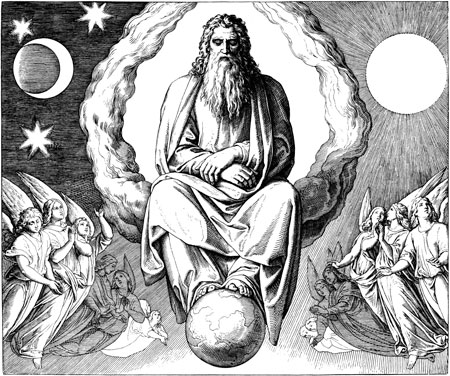
The “uncaused cause”
You say that “causality only makes sense in the framework of spacetime.” If that is the case, then whatever exists now has a cause, since we exist in spacetime. Those things, in turn, also have to have a cause, followed by the things before them, and the ones before them, etc. It seems to be an infinite progression of causes. According to the Second Law of Thermodynamics, the total amount of energy available for use is continuously growing smaller. If there have been an infinite series of events in the past, then there should now be no usable energy left. As you can see, there is usable energy left; therefore there has to be a cause that is uncaused and outside of spacetime. This eternal being, the Uncaused Cause, is God.
Bryan
Thermodynamics
I’m a little disappointed that he brings up the Second Law of Thermodynamics in this refutation. In our email correspondence I already mentioned that I don’t see how the Second Law of Thermodynamics applies here. The Second Law says that in an isolated system, entropy tends not to decrease. I don’t see how this applies considering the current understanding of cosmology. For instance, we don’t know if the universe is an isolated system or even if it is finite or infinite. Until we have established that, whatever the Second Law says about isolated systems is irrelevant.
Infinity
Secondly, in my argument I have not suggested that our universe has existed for an infinite amount of time or that our universe is eternal. So the point of an infinite chain of causes doesn’t apply to my argument. My argument was simply this question: how can a being that is not part of spacetime have a causal relationship with our universe? Or to put simply, if god is not a part of the chain of causes, how can it be the first cause?
Special pleading
Thirdly, this argument is a case of special pleading. If everything that exists has a cause for its existence, why does that not apply to this god? Why is god exempt? If we can have a god without a cause, why can’t we simply have a universe without a cause?

5. The problem of evil
The problem of evil may be summed up as: if there is a good and omnipotent god, why is there so much evil and suffering in the world? This is also known as the Epicurean paradox and predates Christianity. For those who proclaim that their god is omnipotent and omnibenevolent, this is a question they must be able to answer. To my knowledge, no one has been able to give an answer that is satisfactory yet. Bryan takes a stab at it.
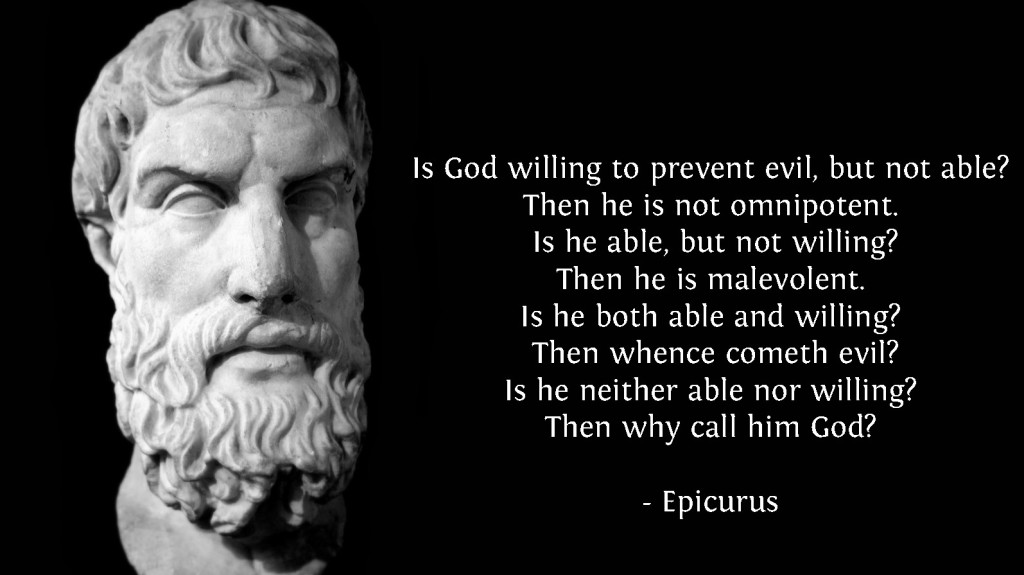
More supernatural entities?
There is a good answer to the fifth section on the problem of evil. The reason that evil exists is intentional rebellion against God, first by the Devil and then by man. God is a just God, so a punishment for rebellion is necessary. Since we have all rebelled against God (Romans 3:23), we all deserve his judgment.
Bryan
Here we see the introduction of another supernatural entity (the devil) to explain why god punishes us. For me to accept this explanation, I must now accept that this new entity exists as well without any evidence for it. This explanation is completely derived from the bible but since there is no good reason to accept it, I don’t see how this is a good explanation.
Nothing moral found
If God is infinite and eternal, then we deserve an infinite, eternal punishment. Fortunately for us, God, in His mercy, has allowed us a time to repent and ask for forgiveness, a time in which we will suffer, as part of His judgment, but will not receive His infinite punishment. This period lasts until death, when there is no turning back. If we confess and repent of our sins and believe that Jesus Christ died to pay the price for our sins, then God will forgive us and bring us into a relationship with Him, setting us free from His eternal judgment.
Bryan
Non sequitur
It doesn’t follow that we should deserve infinite, eternal punishment because a god is infinite and eternal. By definition, all our wrongdoings are temporary because we ourselves are temporary beings. Eternity isn’t just a really long time, it is forever. How is it just to demand eternal punishment for temporary wrongdoings? Also, if we hold that god is omnibenevolent and merciful, how can that same god demand eternal punishment (by burning in hell, no less)? The whole concept is contradictory.
Gullibility
According to Christianity, the only way out of this eternal punishment is to believe in Jesus and to accept him as redeemer. But we must believe in this Jesus based on bad evidence because outside of the mentions of Jesus in the bible, there’s no evidence that such a person ever existed. The only criterium necessary for redemption appears to be gullibility.
Sinister blood cult
Even if a Jesus actually died for our wrongdoings, how can the death of one person serving as a scapegoat absolve me or anyone else of their responsibility? Someone can take my punishment in my stead, like paying my fine for me. But this does not take care of my responsibility. The brutal torture and execution of another human being is something everyone should oppose on moral grounds and the idea that by having someone killed in such a way, we can be redeemed, is morally repugnant. It puts Christianity on equal footing with a sinister blood cult. It will never cease to amaze me how otherwise decent people can think this is in any way moral. There is nothing just, merciful or moral about the entire concept.
The brutal torture and execution of another human being is something everyone should oppose on moral grounds and the idea that by having someone killed in such a way, we can be redeemed, is morally repugnant.
6. There is no proof for the existence of God
My sixth reason why there is no god is that science has never found anything that would suggest that there is one or that one is necessary to explain any phenomenon. Ever since the Scientific Revolution of the 16th century, we have discovered natural processes at work at the heart of everything that was once mysterious. By contrast, not once has a naturalistic explanation been superseded by a supernatural one.
DNA proves god?
In refuting your sixth reason, I would like to point out that science, which you say helps us to find evidence that there is no God behind natural processes, tells us that information can only come from an equal or greater source of information. Where, then, does the information in our DNA come from? It cannot come from evolution, since evolution is an inherently random, unguided process. The only other option is that the information ultimately comes from an intelligent source. What intelligent source is there that could create all the amazing diversity of information that we see in our world? The answer is God. He is the only One who could create our amazing, beautiful world.
Bryan
Argument from ignorance
This argument boils down to an argument from ignorance: “We don’t know where the code/information in DNA comes from, therefore God”. But we do know where the information in DNA comes from, it just requires a little reading in the form of a science textbook. Or you can have a look at this video if textbooks are not your thing. In evolution, information from the environment is communicated directly via natural selection. Varieties that don’t work very well, are eliminated by natural selection. Evolution may be an unguided process, it is not a random process.
Does information need an intelligent source?
You could probably fill several books on this topic alone but I think that won’t be necessary in this case. It’s simply not true that information can only come from an intelligence. Flowering plants don’t have a brain but they can pass information along to pollinating insects that there’s pollen for them. The black and yellow stripes on wasps tell predators that these insects are not a pleasant meal. Even humble bacteria pass along information using a mechanism called quorum sensing. Many animals communicate using pheromones, chemical signals that tell others that there is danger or that the sender is ready to mate. Inside the body, chemical signals called hormones regulate mood or prepare the body for puberty. DNA, our genetic code, is a chemical signalling system inside a single cell. None of these examples of information require a brain, let alone intelligence.

(Photo by David Hablützel on Pexels.com)
Flawed logic
Bryan’s argument is also an example of a “God of the gaps” argument, where a perceived lack of scientific understanding is used as evidence for the existence of a god. But this is a fallacious argument. It doesn’t follow that if there is no satisfactory scientific answer for a particular problem, your god must have done it. “Science doesn’t know, therefore God” is a non sequitur.
Circular reasoning
It’s further an example of circular reasoning: by asserting that information must have another source of information and that the genetic sequence in DNA is information, an intelligent source for DNA is defined into existence without checking if there even needs to be one. We can not simply assume that data found in nature is information. We can not know that it must have another source of information or an intelligence behind it. You can’t make the data have meaning or put an intelligent source behind it simply by defining that this must be the case.
A false dilemma
The argument is also a false dilemma. Bryan states that either evolution or God is responsible for the information in DNA. But there may be other natural phenomena at work, such as extraterrestrials who came to Earth and engineered Earthly DNA in such a way. I don’t accept the ancient aliens explanation because we have no evidence for it, don’t worry. But it is something we can not a priori disregard if we assume our DNA contains information.
My argument was much wider
Besides the flaws in the logic used, Bryan only says there is information in DNA to refute my original argument but that was much wider. It encompasses all kinds of things in the natural word: lightning, gravity, biological diversity, the tides and any other phenomenon you care to name. You can not wave away all the natural explanations that science has discovered by pointing to DNA.
7. Our knowledge of God isn’t improving
For my seventh reason I posit that our knowledge of god isn’t improving. While our understanding of the natural world has grown considerably, we still do not have a definition of god, are still struggling to understand the motives of god or the nature of god.
Your seventh reason for believing God doesn’t exist is that humanity’s knowledge of Him isn’t improving. By your reasoning, since humanity’s knowledge of atheism isn’t improving either, atheism must not exist. We both know that atheism exists, so there must be a problem. Lack of increasing knowledge doesn’t necessarily point to non-existence.
Bryan
While it is true to say that a lack of increasing knowledge doesn’t necessarily point to non-existence, it is somewhat remarkable that this is the case. Theologians have had thousands of years to come up with something, anything solid. Yet to this day, we’re still no closer to understanding the nature of god.
False analogy
Unfortunately, Bryan makes a false analogy in his argument. God and atheism are two separate things, one a magical, anthropomorphic immortal being (in the case of Christianity at least), the other a disbelief in such a being. There’s very little to understand about atheism, since it’s simply a position of disbelief. We can’t have more knowledge about it than that because it doesn’t entail more than that. I fear Bryan is also making a category mistake here, because he seems to imply that a lack of belief in a god is somehow similar to a god.
8. The vastness of the universe
My eighth point is that because our understanding of our place in the universe has increased substantially since the time the bible was written, it’s now rather obvious that this universe was not created with planet Earth and humanity at centre stage. Biblical cosmology seems very childish in comparison with what we know now.
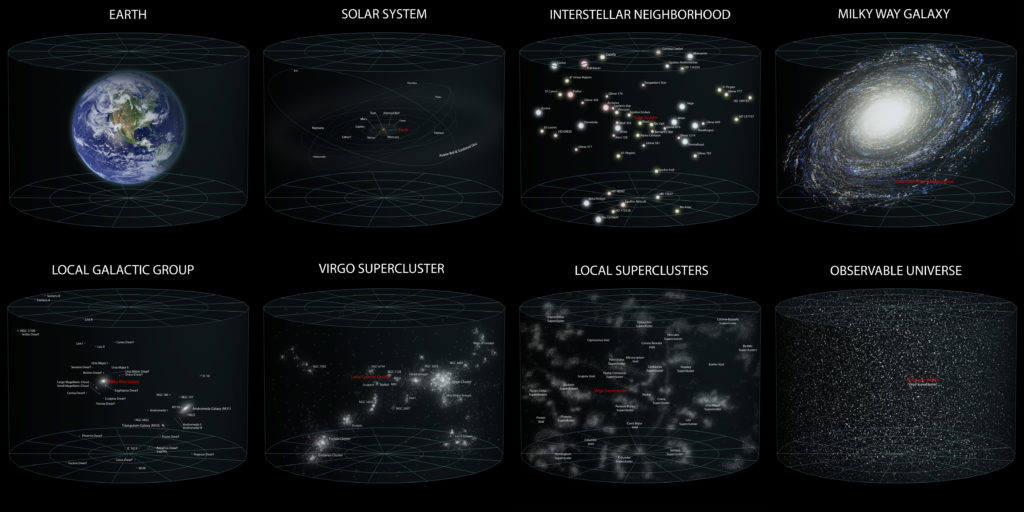
For some reason Bryan didn’t offer a refutation of this point. In the spirit of fairness and completeness, I have pointed out to him that it is missing. I haven’t received an answer to that yet but I will not speculate why that is. Should Bryan wish to offer a refutation after all, I will update this post accordingly.
9. Logical problems with the attributes of God
For my ninth point, I present various logical problems with the 4 properties I have presented above: omniscience, omnipotence, omnipresence and omnibenevolence. These qualities present us with several issues for which I feel, Christianity has no proper answer. An example of such a problem would be: can an omnipotent and omnibenevolent being commit an evil act?
Knowing the future
In the ninth section, you say that since God knows the future, it must be fixed and unchanging, making our freedom of choice non-existent. This is definitely not the case. Think of it this way: I am sitting across from you at a table in McDonald’s, and while you are looking at me, I deliberately pick up my fork and stab my hamburger. Even though you were watching me, you did not make me make that decision. In a similar way, God exists outside of time, so He has a “bird’s-eye view” of all of history. He sees every decision we make, but does not force them upon us, just as you did not force me to decide to stab my hamburger by watching me as I did it.
Bryan
Again, I would very much like to know how a god exists “outside of time”. What does that even mean? The explanation presented by Bryan here, is another example of a false analogy. God may not force a decision upon us. But because it knows what we are going to do before we do it (it knows everything, so also the future), that means we could not have made another choice. Me, in that McDonalds setting, did not know what Bryan was going to do, I also could not know since I am not a mind-reader. An omniscient god on the other hand, knows our mind as well.
A god who knows the future before it happens, is unable to change events or even change its mind about anything. Unfortunately, Bryan did not address this point.
Knowledge from experience
You say that some knowledge can only be gained by experience, like the feeling of committing an evil act. Since God knows everything, does that mean he has committed evil? No. Just because we don’t know how He could have such knowledge doesn’t mean He doesn’t have such knowledge.
Bryan
If we accept the premise that some knowledge can only be gained by experience, it does mean that a god who has never committed an evil act, can not know the feeling of committing such an act. How would it? It would be like attempting to understand colour when you are born blind. We can conceptualise the colour green but that does not give the same experience as seeing the colour green for real.
Omnipotence isn’t omnipotence?
You ask how God could be omnipotent, since that would include doing evil or logically impossible acts. The problem is with your conception of the idea of omnipotence. God can do anything that does not conflict with his nature. Since He is good, he cannot commit evil. Since He is logical, he cannot create logical impossibilities.
Bryan
Words like these really astonish me. Bryan, a mere mammal like myself, somehow has the knowledge to say what his god can and can not do. He is claiming to have knowledge that no human being could possibly have. My questions mean to show that the concept of omnipotence is logically incoherent but the refutation that Bryan gives, asserts things about the nature of a god we can not possibly know. If this god can not do some things due to its nature, it is by definition not omnipotent, unless we define omnipotence to mean something other than omnipotence. That is like saying that smoking is healthy by redefining the word “healthy”.
Conclusion
In my conclusion, I say that I don’t think I have proven beyond any doubt that a god exists. However, I do think that considering my arguments, a reasonable person would be justified in concluding that the god of the three monotheisms does not exist. Bryan disagrees.
In conclusion, you haven’t proven a negative, because there are gaps and problems in your logic. To prove a negative, you have to use correct logic, which is something you failed to do sufficiently in your article. Although I haven’t proven absolutely that there is a God, I hope my arguments have led you to understand that it is reasonable to believe in Him.
Bryan
As I said, I don’t make fun of Bryan with this post. Quite the contrary, actually. Bryan has helped me fortify my original article and he has made an attempt to engage with my arguments. It’s always encouraging to see people trying to use reason and logic. Unfortunately it seems Bryan has not understood most of the logic behind my arguments or my article is terribly inarticulate (or both). However, I can’t help but wonder if cognitive dissonance isn’t a contributing factor to this misunderstanding. Bryan accuses me of gaps and problems in my logic, however the reverse seems to be the case. I have found quite a few in his refutation while his critique of mine doesn’t hold. Needless to say then that I don’t consider the 9 logical reasons why there is no God refuted in any way. Improved yes, but not refuted.
No case to make
Of course, it’s not Bryan’s fault that he hasn’t made a successful case for the existence of a god. It’s quite simply that no successful case can be made for the existence of any god because there’s nothing to build a case on. The most logical explanation for that, is that god is man-made, not the other way around. And I deliberately say man-made because upon reading most holy books, it’s very obvious they were written by men.
A lot of the arguments Bryan uses, come straight from creationists textbooks. But creationism isn’t science, it merely poses as such: it’s pseudoscience. This is part of the reason why I say that religion doesn’t belong in the science classroom.
Religion doesn’t belong in the science classroom
This refutation nicely illustrates why I say that religion doesn’t belong in the science classroom. Bryan begins by saying that he believes the bible is absolutely true. The moment someone says this, that person immediately disqualifies him/herself from any reasonable discussion. To consider something or someone as an ultimate and final authority, is the antithesis of science. In science, there are a lot of knowledgeable people but none of them are considered an authority. Any subject is open for questioning, for revision and for new and better understanding. As Richard Feynman once put it: “I would rather have questions that can’t be answered than answers which can’t be questioned.” This is the spirit of science.
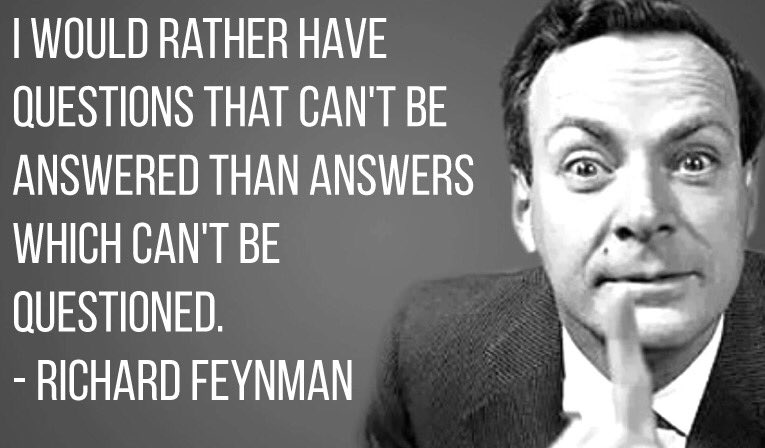
Religion works backwards
Religion doesn’t belong in the science classroom because it necessarily begins with the conclusion and then works backwards to find evidence for it. All of science begins with an observation that leads to a question, not with an answer. If you start with your conclusion and then work backwards, you are required to hammer a lot of square pegs into round holes. That isn’t necessary if you begin with observations and follow the evidence where it leads.
Religion claims to have all the answers
Religion doesn’t belong in the science classroom because it claims to already have all the answers we would ever need. Wherever there’s a question, a mystery, religion says “No, there is no mystery. God did it.” But this is not an answer! It is a surrender of our reason, our innate curiosity. It is an insult to the one thing that maybe sets us apart from other animals: our intellect. “The deepest sin against the human mind is to believe things without evidence”, as Thomas Henry Huxley said. If there is such a thing as sin, this would be it.
Faith is not a pathway to truth
Religion doesn’t belong in the science classroom because it doesn’t provide a method to understand the world. When religion is ever right about the natural world, it is right entirely by accident. That is because religion relies on faith and faith is not a pathway to truth. Religion is revealed wisdom (I use the term generously), it is personal, subjective and non-verifiable. This is again the opposite of science, where results have to be verified, have to be repeated, before they are even accepted by the scientific community as tentatively true.
No free inquiry
Religion doesn’t belong in the science classroom because it doesn’t welcome free inquiry. Rather than have its claims examined, religion resists free inquiry and anything that may threaten its monopoly on the truth. Instead of engaging honestly with critics and sceptics, for hundreds of years religions have condemned them as heretics. Not contend with imagining its critics burn in hell, it often chose to get a head-start by burning them at the stake as heretics. In theocratic countries today, death for heretics, unbelievers and apostates is a very real danger still!
We have to emancipate ourselves
How realistic is it really, that the people who wrote the holy texts of one particular religion all those years ago got it right? That all the scientists with their observations, reasoning, calculations, equipment, experiments and measurements got it all wrong? That there is a god lurking behind the veil of the universe? We have to emancipate ourselves from these facile explanations, the soporific droning from the pulpit and the paltry, fraudulent miracles of weeping statues and burning bushes. Reality is grander and infinitely more magnificent than that. The sooner we do this, the better of we’ll all be. Everyone should be free to believe what they want to believe, sure. But religion doesn’t belong in the science classroom. Not ever again.

